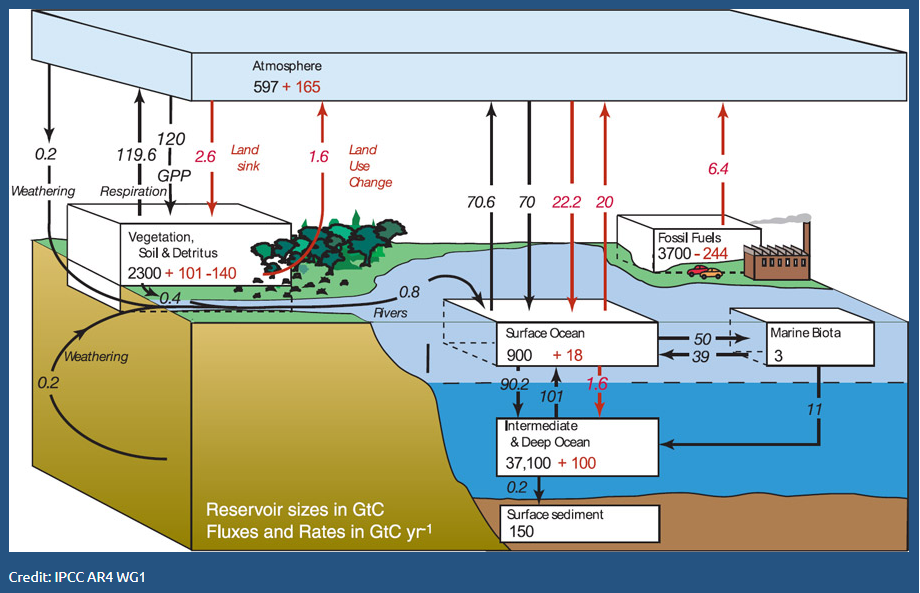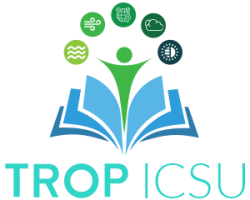Hydrocarbon Combustion

Hydrocarbon Combustion Reading A reading that introduces hydrocarbons, fossil fuels, and the products of combustion of different hydrocarbons such as carbon dioxide- a greenhouse gas. Students will learn about the products of the combustion of different hydrocarbons. The reading includes an animation that shows the net reaction of hydrocarbon combustion. Students will learn to assess […]
Ocean Buffer Chemistry

Ocean Buffer Chemistry Video A video micro-lecture that explains carbonate buffering in the ocean. It includes discussions on the changes in the chemical composition of the ocean caused by a higher concentration of dissolved CO2,ocean acidification and the resulting effect on ocean biota. Students will learn how oceans behave as carbon sinks by absorbing atmospheric […]
Carbon Sequestration in Soil

Carbon Sequestration in Soil Reading A reading by Judith D. Schwatz for YaleE360, published at the Yale School of the Environment, that describes how carbon is stored in soil. It discusses carbon sequestration, carbon capture and storage and carbon sources and sinks. It further highlights how the release of carbon from the soil due to […]
Carbon Sequestration and Climate Change

Carbon Sequestration and Climate Change Reading A reading that describes natural carbon sources and sinks. This reading by Noelle Eckley Selin, Massachusetts Institute of Technology, describes how anthropogenic activities alter the concentration of carbon in various sources and sinks, thus, contributing to global warming. Students will learn about the various types of carbon sinks and […]
Introduction to the Carbon Cycle

Introduction to the Carbon Cycle Reading An infographic that describes the Carbon Cycle and how anthropogenic activities affect the Carbon Cycle. This infographic by NASA explains how higher concentrations of carbon dioxide in the atmosphere due to anthropogenic activities are affecting the natural carbon cycle. Students will learn about the carbon cycle and the absorption […]
Quiz on Carbon Cycle

Quiz on Carbon Cycle Classroom/Laboratory Activity An interactive online quiz to test student’s understanding of the carbon cycle. This quiz by NASA can help students understand the various components of the carbon cycle and their influence on Earth’s climate Students will learn about the processes involved in regulating carbon and the role of atmospheric carbon […]
Teaching the Carbon Cycle through Climate-related Examples

Teaching the Carbon Cycle through Climate-related Examples Overview Overview As a high school or undergraduate Chemistry or Earth Sciences teacher, you can use this set of computer-based tools to help you in teaching topics in environmental chemistry such as the carbon cycle or biogeochemical cycles. This lesson plan allows students to understand the carbon cycle, […]
Infrared Spectroscopy and the Greenhouse Gas Effect

Infrared Spectroscopy and the Greenhouse Gas Effect Overview As an undergraduate-level Organic Chemistry teacher, you can use this set of computer-based tools to help you teach infrared (IR) spectroscopy and the use of IR spectra to detect functional groups in organic molecules. The lesson plan will help students differentiate between IR active molecules and IR […]
Electrochemistry: Use of Electrolysis to Reduce Global Carbon Emissions

Electrochemistry: Use of Electrolysis to Reduce Global Carbon Emissions Overview As a high school or introductory undergraduate Chemistry or Environmental Sciences teacher, you can use this set of computer-based tools to help you in teaching the basics of electrochemistry and how the application of electrolysis can potentially reduce the global carbon dioxide emissions. This lesson […]
Chemistry
Search by Resource Type Lesson Plan Teaching Tool Search by Key Topics in Chemistry Climate Change Overview Environmental Chemistry Hydrocarbon The Carbon Cycle Biogeochemical Cycles Water Cycle Greenhouse Gases Acids and Bases Atomic Number Atomic Mass Isotopes Carbon Chemistry Molecular Structure of Compounds pH Scale The Electromagnetic Spectrum Chemical Weathering The Urey Reaction Phase Diagrams […]


